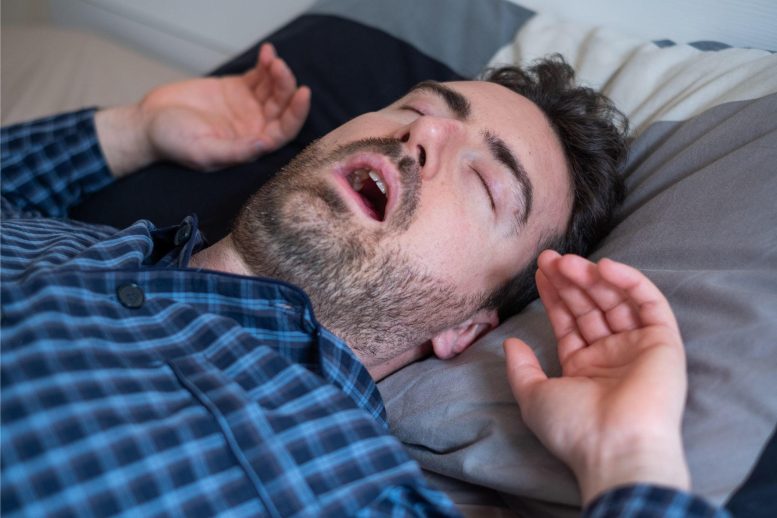
A NIH-funded study indicates that sleep apnea and nocturnal hypoxia are linked to an increased risk of late-onset epilepsy, suggesting that managing sleep disorders may help prevent this form of epilepsy in older adults.
Results offer a deeper understanding of the intricate link between sleep disorders and epilepsy.
According to a new study funded by the National Institutes of Health (NIH) and published in Sleep, there is an association between sleep apnea, low oxygen levels during sleep, and the onset of epilepsy after the age of 60, termed late-onset epilepsy. This connection persists regardless of other established risk factors for both conditions, such as hypertension and stroke. These findings could enhance our understanding of how sleep disorders and late-onset epilepsy are related and might also reveal new potential treatment targets.
“There’s increasing evidence that late-onset epilepsy may be indicative of underlying vascular disease, or neurodegenerative disease, even potentially as a preclinical marker of neurodegenerative disease,” said Rebecca Gottesman, M.D., Ph.D., chief of the Stroke Branch at the NIH’s National Institute of Neurological Disorders and Stroke (NINDS), and an author on the study. “Compared to other age groups, older adults have the highest incidence of new cases of epilepsy – up to half of which have no clear cause. Sleep apnea is common among people with epilepsy, but the association is not well understood.”
Research Methodology and Findings
Researchers, led by Christopher Carosella, M.D., assistant professor of neurology at Johns Hopkins University, Baltimore, identified cases of late-onset epilepsy using Medicare claims and analyzed sleep data from more than 1,300 participants in a study of sleep-disordered breathing and cardiovascular disease. They found that people whose oxygen saturation fell below 80% during sleep, a condition known as nocturnal hypoxia, were three times more likely to develop late-onset epilepsy compared to those who did not have similarly low oxygen levels. In addition, participants with self-reported sleep apnea in later life were twice as likely to develop late-onset epilepsy as those without the sleep disorder.
The degree of hypoxia during sleep was associated with late-onset epilepsy, independent of other co-occurring medical issues and demographic factors. The authors note that the study did not detect an association between the apnea-hypopnea index, a traditional measure of sleep apnea severity.
Sleep apnea is known to be a risk factor for poor brain health in other ways, including the risk of stroke and dementia, but an association with epilepsy had not been described previously. The link to hypoxia suggests that repeated chronic exposure to low oxygen levels overnight might lead to brain changes that ultimately lead to risk of epilepsy. The study can’t determine whether treating or preventing sleep apnea might reduce the risk of epilepsy, but it does suggest that this may be an important potential target for reducing the risk of late-onset epilepsy.
“Discovering a reversible cause for the development of any type of idiopathic epilepsy is an aspirational goal for epilepsy researchers or clinicians,” said Dr. Carosella. “We hope this study might be a small first step in that direction and also an encouragement to evaluate and treat sleep disorders in patients with epilepsy.”
Because sleep apnea can have cardiovascular and brain health-related effects, the findings may also ultimately help to identify individuals at risk for some of these other conditions, providing a potential opportunity for treatment and prevention.
Future studies are needed to assess whether treating sleep apnea in patients at risk for late-onset epilepsy may help prevent the onset of the disease.
Reference: “Sleep apnea, hypoxia, and late-onset epilepsy: the Atherosclerosis Risk in Communities study” by Christopher M Carosella, Rebecca F Gottesman, Anna Kucharska-Newton, Pamela L Lutsey, Adam P Spira, Naresh M Punjabi, Andrea L C Schneider, Kelsie M Full and Emily L Johnson, 06 September 2023, Sleep.
DOI: 10.1093/sleep/zsad233
The study was funded by the National Institute of Neurological Disorders and Stroke, the National Heart, Lung, and Blood Institute, and the National Institute on Aging.
>>> Read full article>>>
Copyright for syndicated content belongs to the linked Source : SciTechDaily – https://scitechdaily.com/late-night-danger-scientists-discover-link-between-common-sleep-condition-and-epilepsy/